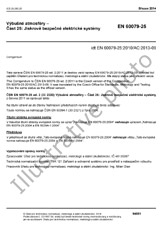We need your consent to use the individual data so that you can see information about your interests, among other things. Click "OK" to give your consent.

IEEE 2956-2023
IEEE Standard for Test Method for Surface Transfer Impedance of the Shielded Power Cables and Connectors for Rail Vehicles
Translate name
STANDARD published on 23.1.2024
The information about the standard:
Designation standards: IEEE 2956-2023
Publication date standards: 23.1.2024
SKU: NS-1165346
The number of pages: 49
Approximate weight : 147 g (0.32 lbs)
Country: International technical standard
Category: Technical standards IEEE
Annotation of standard text IEEE 2956-2023 :
New IEEE Standard - Active.
Uniform measurement procedures and technology are provided for determining the shielding effectiveness of shielded power cables and connectors for rail vehicles at frequencies from 9 kHz to 30 MHz (which can be extended according to the length of the device under test). The test methods include triaxial method and tube-in-tube method. These methods determine the shielding effectiveness by applying specified current and voltage to the screen of the cable and measuring the induced voltage in order to determine the surface transfer impedance.
ISBN: 979-8-8557-0447-1, 979-8-8557-0448-8
Number of Pages: 49
Product Code: STD26725, STDPD26725
Keywords: connectors, IEEE 2956™, shielded power cables, shielding effectiveness, surface transfer impedance, triaxial method, tube-in-tube method,
Category: Vehicular/Transportation Technology
We recommend:
Technical standards updating
Do you want to make sure you use only the valid technical standards?
We can offer you a solution which will provide you a monthly overview concerning the updating of standards which you use.
Would you like to know more? Look at this page.



 Cookies
Cookies
